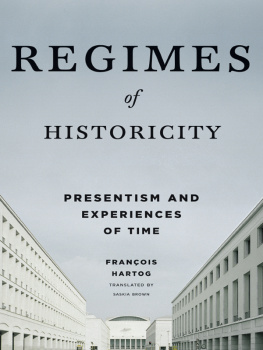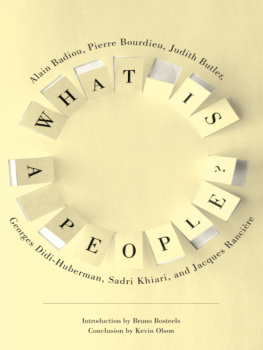REGIMES
of
HISTORICITY
European Perspectives
European Perspectives
A Series in Social Thought and Cultural Criticism
Lawrence D. Kritzman, Editor
European Perspectives presents outstanding books by leading European thinkers. With both classic and contemporary works, the series aims to shape the major intellectual controversies of our day and to facilitate the tasks of historical understanding. For a complete list of books in the series, see .
REGIMES
of
HISTORICITY
PRESENTISM AND
EXPERIENCES
OF TIME
FRANOIS
HARTOG
TRANSLATED BY
SASKIA BROWN
COLUMBIA UNIVERSITY PRESS New York
COLOMBIA UNIVERSITY PRESS
PUBLISHERS SINCE 1893
NEW YORK CHICHESTER, WEST SUSSEX
Copyright 2003 et 2011 Editions du Seuil pour Prsentisme simple ou par dfaut?
Collection La Librairie du XXIe sicle, sous las direction de Maurice Olender
English translation copyright 2015 Columbia University Press
Cet ouvrage a bnfici du soutien des Programmes daide la publication de lInstitut franais.
This work, published as part of a program of aid for publication, received support from the Institut Franais.
All rights reserved
E-ISBN 978-0-231-53876-3
Library of Congress Cataloging-in-Publication Data
Hartog, Franois, author.
[Croire en lHistoire. English]
Regimes of historicity : presentism and experiences of time / Franois Hartog; translated by Saskia Brown.
pages cm. (European perspectives: a series in social thought and cultural criticism) Includes bibliographical references and index.
ISBN 978-0-231-16376-7 (cloth: alkaline paper) ISBN 978-0-231-53876-3 (e-book)
1. Historiography. 2. HistoryPhilosophy. I. Brown, Saskia, translator. II. Title.
D16.8 H37813 2015
907.2dc23
2014026337
A Columbia University Press E-book.
CUP would be pleased to hear about your reading experience with this e-book at .
JACKET IMAGE: ALESSANDRO RIZZI GETTY IMAGES
BOOK AND JACKET DESIGN: CHANG JAE LEE
To Jip Vernant,
by the light of Samzun
in Time
MARCEL PROUST
CONTENTS
AT THE TIME THIS BOOK WAS FIRST PUBLISHED, IN 2003, it already talked of a crisis of time, but obviously not of the crisis that has engulfed us since 2008and I would not go so far as to claim for myself the gift of prophecy (not even with hindsight). However, it is not hard to see that links exist between the crisis, initially financial, which radiated out from the United States, and a world so enslaved to the present that no other viewpoint is considered admissible. What words have we been hearing since 2008? Essentially crisis, recession, depression, but also (total) transformation and even change of era. Some swear by the idea that nothing will ever be the same again, while others (or the same) just as noisily declare that the economy is getting back on track (that is, just like before), that the green shoots are visible, that the upturn is just around the corner and we can see the light at the end of the tunnel.
And then no, hopes are dashed again, this recession is still with usor rather, back it comesand even more threateningly than before. In any case, unemployment is due to rise (again), and the only business plans anyone still dares to make are redundancy lists. In Europe it is now all the fault of certain countries public deficits, while financial speculation seems to have been forgotten and, besides, is doing nicely, thank you (and what more presentist phenomenon than this speculation?). The split-second time of the markets can be accommodated neither by the economy nor by politics, which itself obeys several times: the imperious time of the electoral calendar, the age-old idea of saving time (by deciding to defer decisions till later), and, last but not least, the time of the spin doctors (whose unit of measurement is media time). And so political leaders are required to rescue the euro, for instanceor the whole financial system, for that matterevery month or so, or at least to declare they are doing so. And this raises an even more fundamental problem: our old representative democracies are beginning to realize that they dont really know how to adapt their methods and rhythms of decision making to this tyranny of the immediate without sacrificing precisely what made them democratic in the first place.
We have heard over and over again that there is a big, bad, short-termist financial capitalism, to be contrasted with a good old industrial capitalism and its managers of yesteryear, or only yesterday. But ever since historians started taking an interest in the history of capitalism, they have noted its malleability, and if there is any unity to the concept, in its path from thirteenth-century Italy to the whole of the Western world today, it resides first and foremost, as Fernand Braudel has argued, in its seemingly limitless plasticity, its capacity to mutate and adapt. Capitalism, which Braudel distinguished from the market economy, always goes where there are profits to be made: It represents the high-profit zone. The Belgian historian Henri Pirenne was also struck by the truly surprising regularity with which phases of economic freedom and of economic regulation have succeeded each other in capitalisms history since the Middle Ages. And Marc Bloch pointed out, in a lecture given in 1937, that ever since Solon canceled all debts in sixth-century B.C. Athens, economic progress has consisted of a series of bankruptcies.
Without wishing to transform this preface into a commentary on our present crisis, I think it needs to be said that once the 2008 financial collapse had been dealt with in extremis, it seemedand it still seemsextremely difficult to see beyond it. Reactions were legion, and actions few. A mantra such as the recovery could suddenly sound reassuring because recovering means getting back to where we were before. It is a candid expression of our collective inability to shake off what is generally called short-termism and which I prefer to call presentism: the sense that only the present exists, a present characterized at once by the tyranny of the instant and by the treadmill of an unending now.
WHAT DOES THE HISTORIAN HAVE TO OFFER? NOT THE














